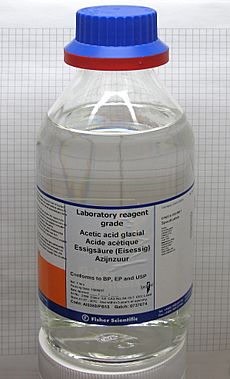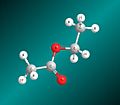Solvent facts for kids

A solvent is a special substance that can dissolve other things. When a solvent dissolves something, it creates a solution. Think of sugar dissolving in water – the water is the solvent, the sugar is the solute, and the sweet water is the solution!
Most of the time, solvents are liquids. But did you know they can also be solids or even gases? The most common solvent we use every day is water. It's amazing at dissolving many things, from salt to sugar.
Many other common solvents are called organic solvents. These are chemicals that contain carbon. Solvents usually have a low boiling point, which means they turn into a gas (evaporate) easily. This is helpful because you can often remove the solvent by heating it, leaving the dissolved substance behind. Solvents should not react with the things they dissolve; they need to be "inert," meaning they don't change chemically.
Solvents can also help us separate useful compounds from a mixture. A great example is making coffee or tea. Hot water acts as a solvent, pulling out the flavors and colors from the coffee grounds or tea leaves. Most solvents look like clear, colorless liquids and often have a unique smell.
The concentration of a solution tells you how much of a substance is dissolved in a certain amount of solvent. Solubility is the maximum amount of a substance that can dissolve in a specific amount of solvent at a certain temperature.
Contents
Everyday Uses of Solvents
You might not realize it, but solvents are used in many things around you!
- In dry cleaning, special solvents like tetrachloroethylene clean clothes without water.
- Paint thinners, like toluene, help make paint easier to spread and clean brushes.
- Nail polish removers and many glues use solvents like acetone or ethyl acetate to work.
- Spot removers use solvents like hexane to get rid of stains.
- Some detergents contain citrus terpenes, which are natural solvents.
- Perfumes use ethanol to carry their lovely scents.
- Solvents are also super important in making new chemicals in labs and factories.
Staying Safe with Solvents
Some solvents can be harmful if not handled carefully. It's important to know how to use them safely, especially if you're working with them in a science class or at home.
Protecting Your Health
Some solvents, like benzene (found in gasoline), can be harmful over a long time. They might affect important organs in your body, such as your liver, kidneys, or brain. Always be careful and follow safety rules when using any solvent.
General Safety Tips
Here are some important safety rules when working with solvents:
- Work in a well-ventilated area: This means using a fume hood or being in a place with lots of fresh air. This helps prevent breathing in solvent vapors.
- Keep containers closed: Always make sure solvent bottles are tightly sealed when not in use. This stops vapors from escaping.
- No open flames: Many solvents can catch fire easily. Never use a flame near them. Use electric heaters instead if you need to warm something.
- Don't pour down the drain: Never pour flammable solvents down the sink. This can cause explosions or fires in the pipes.
- Avoid breathing vapors: Try not to inhale the fumes from solvents. They can be bad for your lungs.
- Protect your skin: Many solvents can be absorbed through your skin. They can also make your skin dry or cause irritation. Always wear gloves if you might touch them.
Images for kids
See also
 In Spanish: Disolvente para niños
In Spanish: Disolvente para niños
 | May Edward Chinn |
 | Rebecca Cole |
 | Alexa Canady |
 | Dorothy Lavinia Brown |


